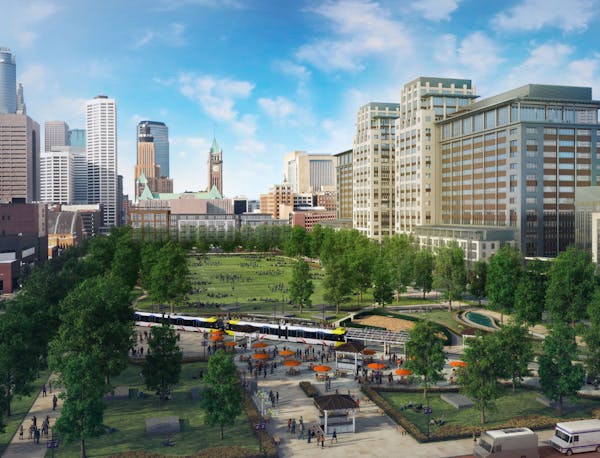Minneapolis city officials are scrambling to figure out how to run and finance a massive downtown park after the park board pulled out of the project Wednesday night.
The Minneapolis Park Board voted 6 to 2, with one abstention, to not be involved in "the Yard," which will sit in the shadow of the new Vikings stadium and be surrounded by new offices and apartments on the east edge of downtown.
Leaders of the already cash-strapped parks department are concerned by the lack of money to build and run the nearly two-block, multimillion-dollar city park. They remain skeptical that it can raise enough rental income when the Vikings and Minnesota Sports Facilities Authority are already claiming a large share of days.
"It ain't a park, and it certainly ain't public," said Commissioner Anita Tabb in explaining why she felt park system involvement wasn't right. The board rejected by one vote a proposal by immediate past President John Erwin to continue negotiating in hopes of getting a financial deal and a park that would be both more public and better financed.
After not being part of negotiations for the future of the property, park officials were forced into the center of the issue after a judge determined that city officials lack authority to create and manage parks.
The decision throws the park plan back into the hands of City Hall at a crucial time for a project that city leaders hope will become a centerpiece attraction that connects the new stadium to downtown.
Downtown business leaders have jumped into the issue, sketching out a plan for a new conservancy organization to eventually manage the Yard and other downtown parks, such as Peavey Plaza.
Minneapolis Downtown Council President Steve Cramer said they are working to firm up a suitable revenue model as they develop the conservancy structure. He said money from events and potential concession sales will help balance the books.
The stakes are high for a park that must reconcile the distinct challenges of being inviting and profitable, Cramer said.
"Somehow that park has to function and be an asset for the community," he said. "It is a little bit of a different animal than the wonderful public parks we have throughout Minneapolis."
For now, city officials must wrestle with how to fund and manage the project as they prepare to seek design proposals for the space.
"The operations of the park are going to be a challenge," Council President Barb Johnson said.
Johnson said she does not believe it will be as expensive to operate as park officials estimate.
She was inspired by a recent visit to Bryant Square Park in New York City, where small eateries and other businesses pay to rent space temporarily.
"To me it offers a real example of simplicity that I would like to see at the Yard," Johnson said. "And I think the only challenge for that kind of vision is that we … obviously don't have the density and the number of people that would surround the park. But we'll have a substantial number with the office buildings that are there."
The park will likely be built in phases, starting with a basic grassy space before the larger vision is completed.
City leaders already have money earmarked for the basic grass park as part of the larger stadium agreement. Money for the more elaborate park remains unclear, particularly since the city will likely take in far less from selling air rights above a nearby parking ramp due to the elimination of hotel plans.
An analysis by park officials determined the cost of maintaining and operating the park would far outstrip the rent from the few prime days it is not being used by the Vikings or stadium authority. The additional financial pressure would have been on top of a $1.3 million projected parks budget shortfall just to maintain existing programs next year.
Park officials estimate it will cost $6 million to build the bare-bones park and up to $20 million once amenities are added.
The park staff analysis raised concerns that anticipated housing near the park would draw complaints about loud events, creating tension in the neighborhood.
The Vikings and the authority already are guaranteed to be able use the park up to 80 days a year, under the agreement. Park officials estimate they could rent only on 82 of the 214 days, including four weekends, during the prime period of April 1 to Oct. 31, with priority given to the Vikings, a potential major league soccer franchise and the stadium authority. The rental projection assumes that the park will be rented for all four weekends and one-quarter of available weekdays.
The analysis said that with priority given to football, organizers of other events seeking to rent the space would have to wait for the May release of the league schedule to book an event between August and December. That is far less time than organizers of large-scale events such as festivals and races typically need for locking in their sites.
The cost of maintaining a basic park — mowing, hauling trash and cleaning bathrooms — comes to $419,424 a year, the analysis found. But park officials say the costs for operating the park would easily push $500,000, and a more complex park could cost $2 million to $3 million a year just to maintain.
Confronted by such numbers, commissioners said they were walking away from a park deal that they had no hand in negotiating. The alternative, said Commissioner Steffanie Musich, was a "burdensome and untenable agreement they have made on our behalf."
steve.brandt@startribune.com • 612-673-4438
Twitter: @brandtstrib
